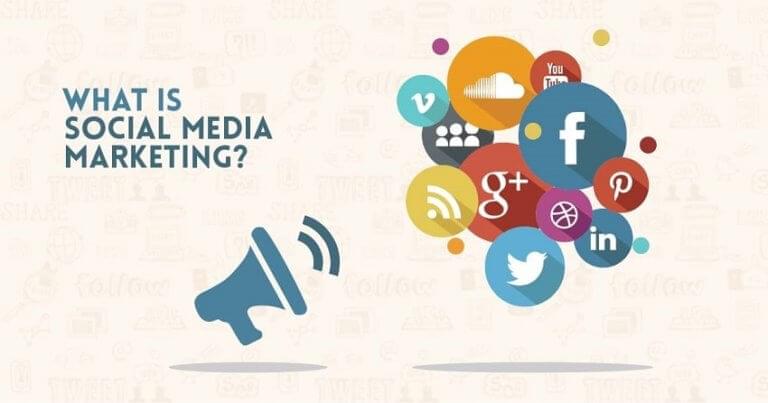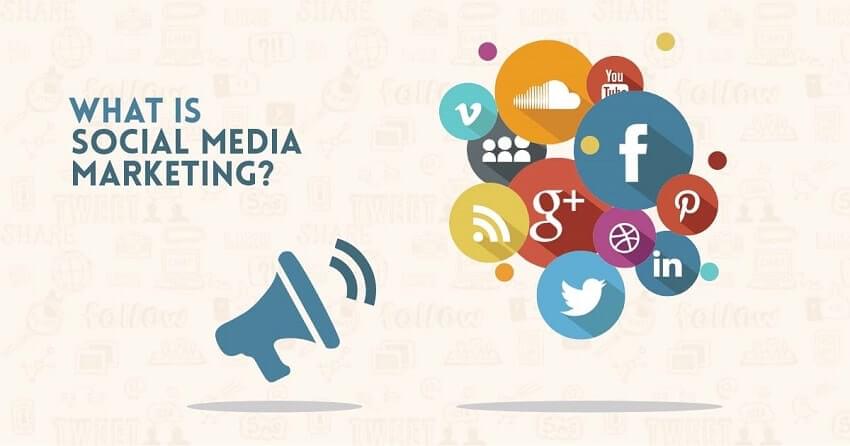

Social media marketing (SMM) is a form of Internet marketing that utilizes social networking websites as a marketing tool. The goal of SMM is to produce content that users will share with their social network to help a company increase brand exposure and broaden customer reach.
One of the critical components of SMM is social media optimization (SMO). Like search engine optimization (SEO), SMO is a strategy for drawing new and unique visitors to a website. SMO can be done in two ways: adding social media links to content, such as RSS feeds and sharing buttons, or promoting activity through social media by updating a status tweeting, or blog posts.
SMM helps a company get direct feedback from customers (and potential customers) while making the company seem more personable. The interactive parts of social media allow customers to ask questions or voice complaints and feel they are being heard.
Why an Effective Social Media Marketing Strategy is Important?

According to Social Media Examiner, 97% of small businesses use social media to attract new customers, but 85% of business owners aren’t sure what social media tools to use. Unsettling is the statistic that 63% of consumers who search for businesses online are more likely to become consumers of brands with an established social media presence.
Social media marketing helps to validate your brand, and it’s no longer optional. It’s an essential way for companies to reach consumers, and tell those consumers that their brand is active and focused on communication.
The longer you wait, the more you have to lose. When done effectively, social media marketing can lead to more customers, more traffic, and more engagement. Having a social media presence without an active social media marketing strategy can be just as catastrophic for your business as having no plan at all.
Before we get into how to build an effective social media marketing strategy, here is a look at a few of the ways social media marketing can improve your business:
- Branding
Displaying your business’ personality through social media is one of the best ways to connect with your target audience. Your social media channels are just expanded opportunities for your brand’s voice, content, and interactions. A new customer may stumble upon your Instagram feed if they’re an avid Instagram user or a customer might be more likely to become a repeat purchaser if your online brand presence becomes more consistent and recognizable.
- Customer Loyalty
Brands are placing a more significant emphasis on customer experience because of the impact it has on reputation. Brands who engage on social media channels receive higher loyalty from their customers. More than 50% of Americans who follow their favorite brands on social media are more loyal customers than those who don’t.
- Conversion
Every post, ad, follower, blog post, and email is an opportunity for customers to convert. Whether you’re a B2C or B2B company, social media can be a handy tool for gaining new leads and moving people through your sales funnel.
- Humanization
Faceless corporations are a thing of the past. These days, consumers care not only about what they buy but also the type of company they’re buying from. Social Media has a 100% higher lead-to-close rate than outbound marketing. With this advantage, you can practice rapid response to build a connection with a customer, rather than putting them through the automatic recording steps via telephone.
- Customer Insights
Have you practiced social listening? Social media allows you to gain valuable insights about your customer’s interests and behaviors. Check out reviews or comments to see what people think of your business. Look at engagement rates on each social media post to measure what types of content generate the most interest. Track conversions through your purchase or lead ads to find out what kind of audience benefits the best from your product or service.
- Customer Service
The best place for customer care lies on social media. Before brands got involved, it was created solely for communication, and that is still its core foundation. Customer interactions allow for the public opportunity to make complaints right. It’s also a place to enhance your relationship with them further by following them back, recommending additional products, and creating an open line of communication.
- Inbound Traffic
Last but not least, the reason that is most likely to lead to ROI: increased inbound traffic. Without social media, your leads are limited to people who are familiar with your brand and people who find you by searching ranked keywords. By increasing your social media content frequency and expanding your social media channel presence, you are adding another path back to your site. And as a result, you’ll receive higher traffic, as well as more conversions.
Social media is a long-term approach, meaning, you won’t be reaping these benefits overnight. But if you can effectively see why social media marketing is important, then get ready to dive into why creating a social media marketing strategy only enhances these benefits.
- Influencer Marketing Opportunities
Social media has given rise to the phenomenon of influencer marketing, where brands collaborate with influential individuals to promote their products or services. By leveraging the reach and credibility of influencers, brands can tap into their followers’ trust and expand their audience. Influencer marketing campaigns can generate substantial brand awareness, drive traffic, and boost sales. Research shows that 89% of marketers believe that the return on investment (ROI) from influencer marketing is comparable to or better than other marketing channels.
- Augmented Reality
Augmented Reality (AR) plays a beneficial role in social media marketing. Brands utilize AR filters in various social media platforms like Instagram and Snapchat and lenses for creating interactive content, industries like beauty and fashion create virtual try-ons and product visualization to understand what fits best for the consumer. Producing Interactive advertising campaigns for educational content like tutorials or training, and location-based AR enhances user engagement. AR contributes to brand storytelling by creating an immersive experience for the users that holds a narrative and behind-the-scenes experiences. The technology also provides valuable data for analytics, tracking engagement, and refining marketing strategies. Integrating AR in social media enriches brand experiences, making content more memorable and shareable for increased audience interaction.
Conclusion:
Social media has revolutionized the way brands connect with their target audience. By harnessing the power of social media platforms, brands can amplify their brand awareness, engage with customers, target their advertising efforts, gain valuable insights, and leverage influencer marketing. The benefits of social media for brands are evident in the statistics and examples provided, making it an essential component of any modern marketing strategy. Embracing social media as a brand opens up a world of possibilities and allows businesses to thrive in the digital landscape.



